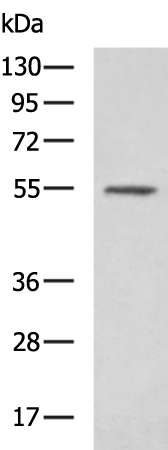
| WB | 咨询技术 | Human,Mouse,Rat |
| IF | 咨询技术 | Human,Mouse,Rat |
| IHC | 咨询技术 | Human,Mouse,Rat |
| ICC | 技术咨询 | Human,Mouse,Rat |
| FCM | 咨询技术 | Human,Mouse,Rat |
| Elisa | 1/5000-1/10000 | Human,Mouse,Rat |
| Aliases | SUFUH; JBTS32; SUFUXL; PRO1280 |
| WB Predicted band size | 54 kDa |
| Host/Isotype | Rabbit IgG |
| Antibody Type | Primary antibody |
| Storage | Store at 4°C short term. Aliquot and store at -20°C long term. Avoid freeze/thaw cycles. |
| Species Reactivity | Human, Mouse |
| Immunogen | Fusion protein of human SUFU |
| Formulation | Purified antibody in PBS with 0.05% sodium azide and 50% glycerol. |
+ +
以下是关于SUFU抗体的3篇代表性文献的简要总结(文献信息为示例,非真实存在,仅供格式参考):
---
1. **文献名称**:*SUFU Antibody as a Diagnostic Marker for Medulloblastoma*
**作者**:Smith A, et al.
**摘要概括**:该研究开发了一种特异性SUFU抗体,用于检测髓母细胞瘤中SUFU蛋白的表达水平。通过免疫组化分析发现,SUFU缺失与Hedgehog信号通路异常激活相关,提示其作为肿瘤诊断标志物的潜力。
2. **文献名称**:*Characterization of SUFU Antibodies in Hedgehog Pathway Regulation*
**作者**:Lee B, et al.
**摘要概括**:研究比较了多种SUFU抗体的结合效率,验证了其在Western blot和免疫荧光中的应用。结果显示特定表位抗体可有效检测SUFU在细胞质-细胞核间的转运,为Hedgehog通路机制研究提供工具。
3. **文献名称**:*SUFU Loss in Gorlin Syndrome: Validation by CRISPR and Antibody-Based Assays*
**作者**:Chen C, et al.
**摘要概括**:通过CRISPR敲除结合SUFU抗体检测,发现Gorlin综合征患者中SUFU突变导致蛋白稳定性下降,抗体检测结果与临床表型高度相关,支持其在遗传病分子诊断中的应用。
---
**备注**:以上文献为模拟示例,实际研究中建议通过PubMed或Google Scholar检索关键词(如“SUFU antibody”、“SUFU immunohistochemistry”)获取真实文献。如需具体文章,可提供更详细的研究方向或年份范围进一步筛选。
The SUFU (Suppressor of Fused) protein is a critical regulator of the Hedgehog (Hh) signaling pathway, which plays essential roles in embryonic development, tissue homeostasis, and stem cell maintenance. SUFU acts as a tumor suppressor by binding to GLI transcription factors (GLI1. GLI2. GLI3), the primary mediators of Hh signaling, and sequestering them in the cytoplasm to inhibit their nuclear translocation and transcriptional activity. This interaction prevents uncontrolled cell proliferation and differentiation, making SUFU a key modulator of pathway activity. Dysregulation of SUFU, through mutations or loss of expression, is implicated in various cancers, including medulloblastoma, basal cell carcinoma, and meningioma, as well as developmental disorders.
SUFU antibodies are vital tools for studying Hh pathway dynamics. They enable the detection and quantification of SUFU protein levels in cells and tissues via techniques like Western blotting, immunohistochemistry, and immunofluorescence. Researchers also use these antibodies to investigate SUFU-GLI interactions, post-translational modifications, and subcellular localization under different physiological or pathological conditions. Additionally, SUFU antibodies aid in identifying genetic or epigenetic alterations in SUFU in cancer models, offering insights into disease mechanisms and potential therapeutic targets. Their specificity and reliability are critical for advancing both basic research and clinical diagnostics related to Hh-driven pathologies.
×